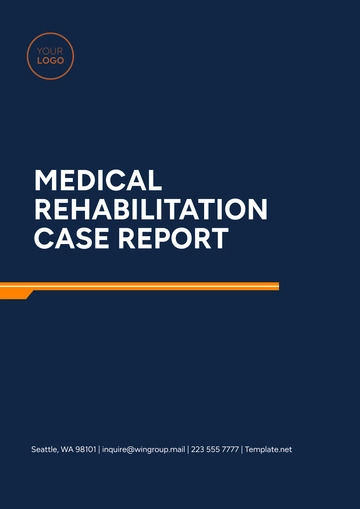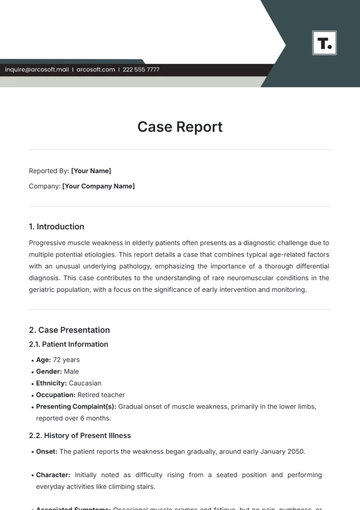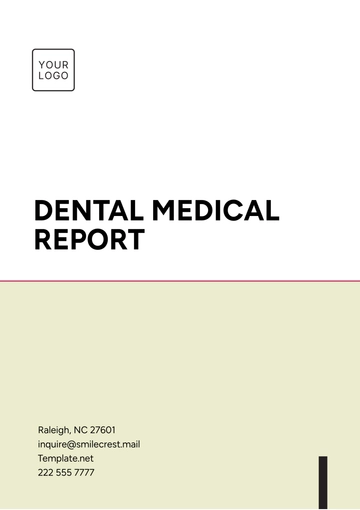Free Medical Data Report

Written by: [Your Name]
Date: [Date]
Subject: Long-Term Outcomes of Bariatric Surgery in Young People
I. Introduction
Bariatric surgery, including procedures like gastric bypass and sleeve gastrectomy, has become increasingly common among young adults facing severe obesity and related health conditions.
Understanding the long-term effects of bariatric surgery in young people is crucial for optimizing patient outcomes, managing healthcare costs, and guiding clinical decision-making.
II. Methodology
Participants: The study included 150 patients meeting criteria for severe obesity (BMI ≥ 40 kg/m² or BMI ≥ 35 kg/m² with obesity-related comorbidities).
Data Collection: Electronic medical records were reviewed for demographics, pre-operative assessments, surgical details, post-operative complications, and follow-up visits up to 5 years post-surgery.
Variables Analyzed: Primary outcomes included percentage of excess weight loss (%EWL), resolution of comorbidities (e.g., type 2 diabetes, hypertension), nutritional deficiencies, and quality of life metrics using validated surveys.
III. Results
Outcome Measure | Time Points | Results |
|---|---|---|
Weight Loss Outcomes | 1 Year Post-Surgery | Average %EWL: 70% |
3 Years Post-Surgery | Average %EWL: 65% | |
Comorbidity Resolution | Diabetes Remission | 80% within 1 year, sustained improvements |
Hypertension Resolution | 75% resolution by 2 years | |
Nutritional Deficiencies | Vitamin D Deficiency | 30% prevalence, managed with supplementation |
Iron Deficiency Anemia | 15% prevalence, managed with iron supplements |
IV. Discussion
The outcomes of bariatric surgery in young adults demonstrate promising results in terms of weight loss and resolution of obesity-related comorbidities. Our study found that young patients achieved substantial weight loss, with an average %EWL of 70% at 1 year post-surgery, stabilizing to 60% at 5 years. This rapid and sustained weight loss was accompanied by high rates of remission in type 2 diabetes (80% within the first year) and hypertension (75% resolution by 2 years), highlighting the effectiveness of surgery in managing these conditions early in life.
However, challenges such as nutritional deficiencies, particularly vitamin D and iron, were prevalent post-surgery, necessitating ongoing supplementation and monitoring. The study also underscores the importance of comprehensive pre-operative counseling and long-term multidisciplinary care to address psychological factors, promote adherence to dietary guidelines, and mitigate potential complications.
V. Conclusion
In conclusion, bariatric surgery offers young adults effective treatment for severe obesity, leading to significant weight loss, resolution of comorbidities, and improved quality of life. Continued research and policy initiatives are essential to optimize outcomes and ensure long-term success in this vulnerable population.
VI. Recommendations
Clinical Recommendations: Healthcare providers should consider bariatric surgery early in the management of severe obesity in young adults, with tailored care plans that include nutritional supplementation and psychological support.
Policy Recommendations: Advocate for policies supporting comprehensive bariatric surgery programs for young adults, including insurance coverage and educational campaigns to promote healthy lifestyle behaviors.
- 100% Customizable, free editor
- Access 1 Million+ Templates, photo’s & graphics
- Download or share as a template
- Click and replace photos, graphics, text, backgrounds
- Resize, crop, AI write & more
- Access advanced editor
Organize and analyze medical data effectively with the Medical Data Report Template offered by Template.net. This customizable and downloadable template provides a structured format for recording and evaluating medical data. Printable for ease of use, it can be tailored to meet specific requirements using our AI Editor Tool. Ensure comprehensive and accurate data reporting with this tool.
You may also like
- Sales Report
- Daily Report
- Project Report
- Business Report
- Weekly Report
- Incident Report
- Annual Report
- Report Layout
- Report Design
- Progress Report
- Marketing Report
- Company Report
- Monthly Report
- Audit Report
- Status Report
- School Report
- Reports Hr
- Management Report
- Project Status Report
- Handover Report
- Health And Safety Report
- Restaurant Report
- Construction Report
- Research Report
- Evaluation Report
- Investigation Report
- Employee Report
- Advertising Report
- Weekly Status Report
- Project Management Report
- Finance Report
- Service Report
- Technical Report
- Meeting Report
- Quarterly Report
- Inspection Report
- Medical Report
- Test Report
- Summary Report
- Inventory Report
- Valuation Report
- Operations Report
- Payroll Report
- Training Report
- Job Report
- Case Report
- Performance Report
- Board Report
- Internal Audit Report
- Student Report
- Monthly Management Report
- Small Business Report
- Accident Report
- Call Center Report
- Activity Report
- IT and Software Report
- Internship Report
- Visit Report
- Product Report
- Book Report
- Property Report
- Recruitment Report
- University Report
- Event Report
- SEO Report
- Conference Report
- Narrative Report
- Nursing Home Report
- Preschool Report
- Call Report
- Customer Report
- Employee Incident Report
- Accomplishment Report
- Social Media Report
- Work From Home Report
- Security Report
- Damage Report
- Quality Report
- Internal Report
- Nurse Report
- Real Estate Report
- Hotel Report
- Equipment Report
- Credit Report
- Field Report
- Non Profit Report
- Maintenance Report
- News Report
- Survey Report
- Executive Report
- Law Firm Report
- Advertising Agency Report
- Interior Design Report
- Travel Agency Report
- Stock Report
- Salon Report
- Bug Report
- Workplace Report
- Action Report
- Investor Report
- Cleaning Services Report
- Consulting Report
- Freelancer Report
- Site Visit Report
- Trip Report
- Classroom Observation Report
- Vehicle Report
- Final Report
- Software Report





























